Submitted by Aubri Plourde on Wed, 04/29/2015 - 14:22
My colleagues have listed their own top picks from this year's array of insights an analyses. You'll notice a few repeats on my list--a sure sign of their success--but I'll admit, choosing a representative sample is a hard task. We should all go back and reread the blog, just in case...
Without further preamble, then, here are my favorite posts of 2014-2015:
Submitted by Aubri Plourde on Thu, 04/23/2015 - 21:15
Fox’s New Girl could never have avoided the question of gender. The very title isolates gender issues by framing protagonist Jessica Day within the male-dominated apartment she joins. The sexual politics of New Girl are mostly wrapped up in Zooey Deschanel’s character. My friend Mike, for example, has written about Jess as a postfeminist figure here, and the show creator herself has more than once addressed the gender politics of the Nick-and-Jess coupledom. I’d like to acknowledge that the “adorkable” appeal of Deschanel’s character positions her strangely between feminist and postfeminist positions, but, for the purpose of considering the visual appeal of the show, I’m more drawn to the way the show represents the masculinity of lovable douchebag, Schmit.
Most of Schmidt’s best and worst qualities are verbal, not visual. For example, entire reels of one-liners, like this one and this one show off the snappy writing of New Girl’s staff. Still, the character’s arch depends heavily on the transition between the days when he was obese and the fit version we see weekly.
Schmidt's story begins like this:
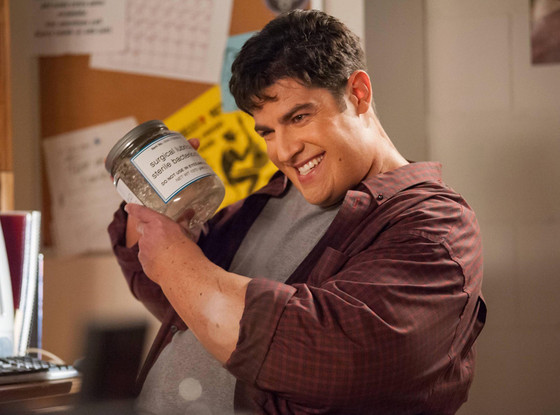
Image Credit: E!online
Submitted by Aubri Plourde on Wed, 04/15/2015 - 21:52
“I always think of her as a spider,” Laura Prepon says of her Orange is the New Black character, Alex Vause, in an interview for Elle magazine. Or, we might say, a snake. The show certainly presents Alex Vause as a temptress, the piece of fruit that convinced good-girl Piper Chapman to jump from grace.
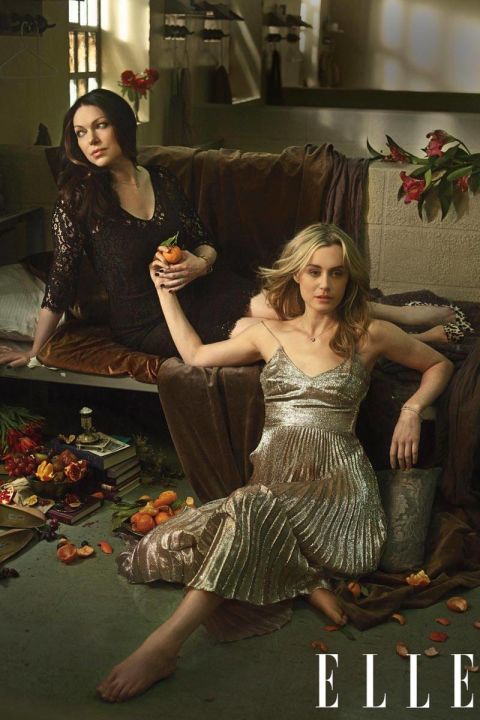
Image Credit: Elle
Submitted by Aubri Plourde on Wed, 04/08/2015 - 22:49
This post was generously guest-written by former .Viz contributor, Casey Sloan. Casey incessantly reads and writes about gothic novels, Victorian culture, individualism, and gender studies. She has craftily parlayed these fixations into research interests for the UT English Department's PhD program. Currently, she is exploring DWRL avenues in order to drag other passions, particularly internet identity and video game culture, into her professional life.
You are given a ball at a fair. You are told you can either throw the ball at a racist carnival barker or at an interracial couple tied up in the midst of insulting cardboard cutouts. As a player in this video game (Bioshock: Infinite, to be precise), you are faced with the question: what do I do? As a critic of this video game, you are faced with the question: what does being faced with the question "what do I do" mean?
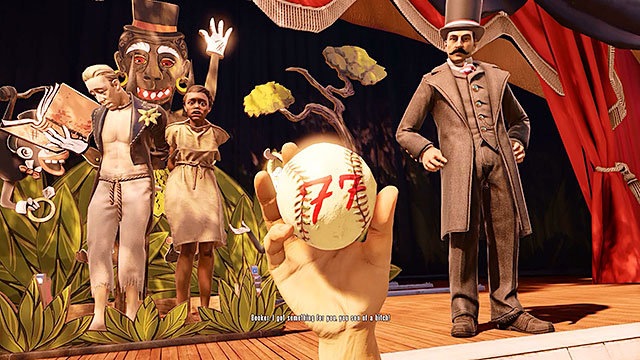
Image Credit: Bioshock Wikia
Read more about Moving Targets: Player Choice and the Politics of Bioshock: Infinite
Submitted by Aubri Plourde on Wed, 04/01/2015 - 17:02
In an April 2013 opinion post for The Atlantic, feminist journalist Amy Schiller brought dolls to the forefront of girls’ feminist activism by announcing, “American Girls Aren’t Radical Anymore.” Citing Mattel Incorporated’s takeover in 1998 of Pleasant company, the American Girls’ original home, as a main source of the shift in the dolls’ political and socioeconomic messages, Schiller complains of the company’s shifting focus from the historical characters that were so familiar to many American girlhoods and toward “Girl of the Year” dolls and dolls designed to look especially like each customer.
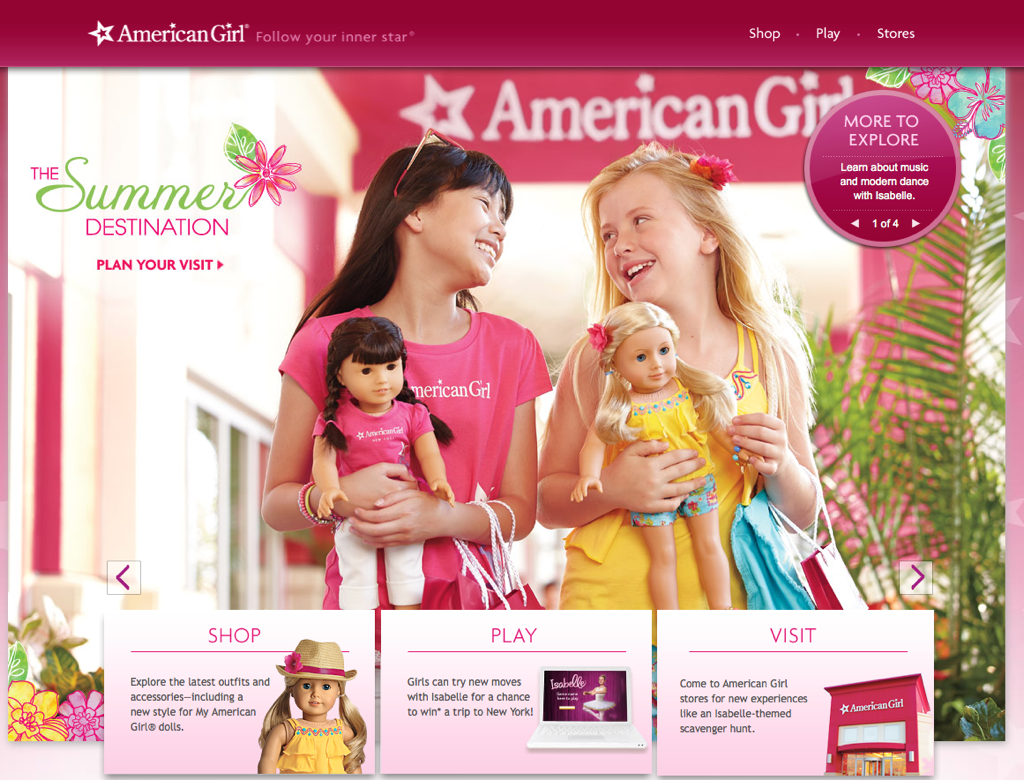
Image Credit: American Girl
Submitted by Aubri Plourde on Tue, 02/24/2015 - 11:38
For those of you who did not grow up with the unparalleled glory that is VeggieTales, I give you Bob the Tomato and Larry the Cucumber.
Submitted by Aubri Plourde on Tue, 02/24/2015 - 11:00
Last year, when Miley Cyrus gave us this delight:
the interwebs exploded with home critics—often sloppy analyses of Cyrus’s performance, rife with moral judgment and fear for the future. The outrage regards not whether the singer is talented, or whether her show was successful, but over her behavior, and, especially, her clothing.
Submitted by Aubri Plourde on Mon, 02/23/2015 - 15:58
Apparently, Kim Karshasian and Kanye West dragged their toddler to Fashion Week. The dubious wisdom of doing such a thing is beyond the scope of this post—North West’s misery has already been
catalogued.
Submitted by Aubri Plourde on Wed, 02/18/2015 - 16:06
I’m going to take it as an assumption that in any thorough discussion of fitness, we’re also inevitably going to talk about body image. Lately, when I’m thinking about fitness and body image, I am unsurprisingly (and, perhaps unoriginally) drawn to underwear. I am not the first to write about a connection between underwear advertisement and fitness complexes. There’s even a meme that highlights the absurdity of underwear advertising:
Submitted by Aubri Plourde on Thu, 02/12/2015 - 10:50
This is not an ad.
It is, however, a shameless account of my fixation on the Jawbone UP24 fitness app. I'll admit, I love data, especially highly specific digital data. Admittedly, some of my organizational tendencies are old-school. Every day, I make a note card filled with every single thing I'll do in the next twenty-four hours, including "drink 3/4 gallon of water" and "exercise." I'm not sure why I like the note cards in spite of my plethora of technology--all of which is capable of organizing and replicating my to-do lists. I think maybe I fetishize the documentation of it. I really like running a nice line through each of my tasks. The actual exercise from the list, though, I need to be as techy as possible. I want records of my heart rate, my sleep cycles, my weight training routines. And I want them to be pretty.
So a little over a year ago, while recovering from spinal surgery, I bought an UP24. For anyone who isn't familiar with fitness wearables, I give you the UP:
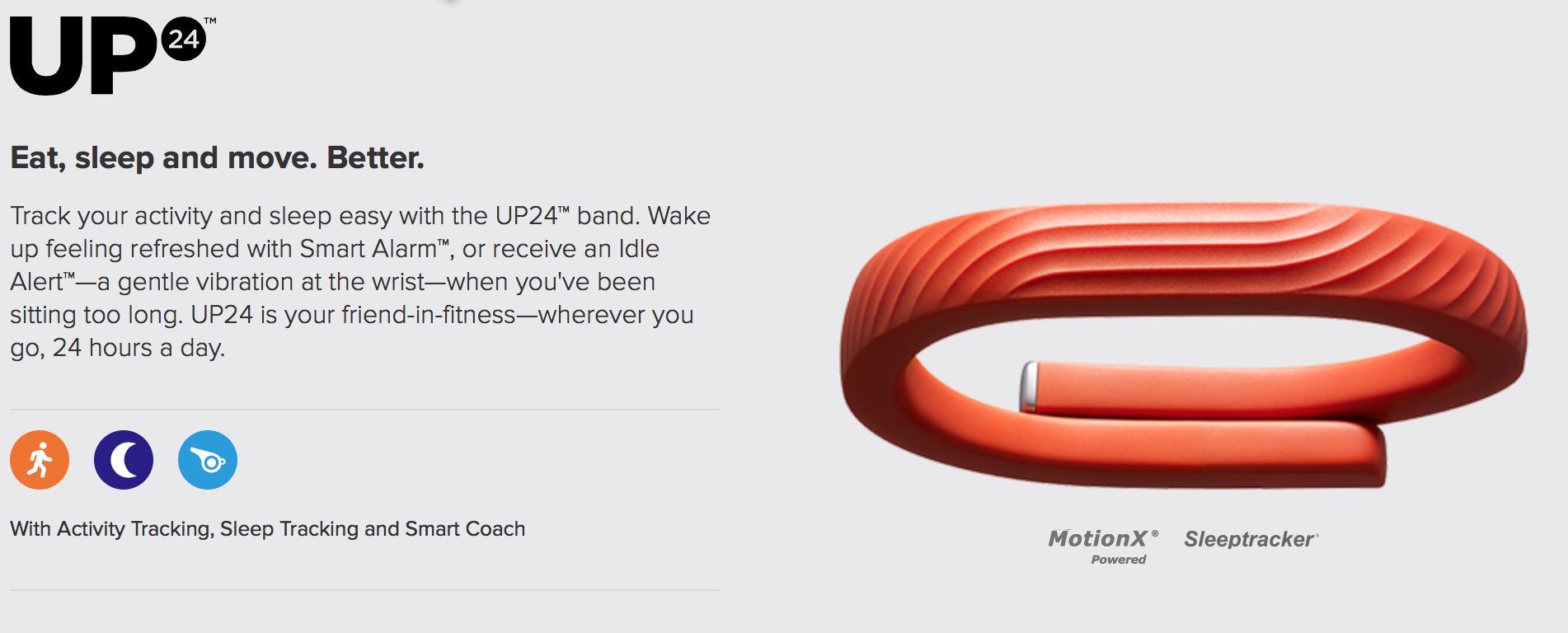
Image Credit: Jawbone
Pages
